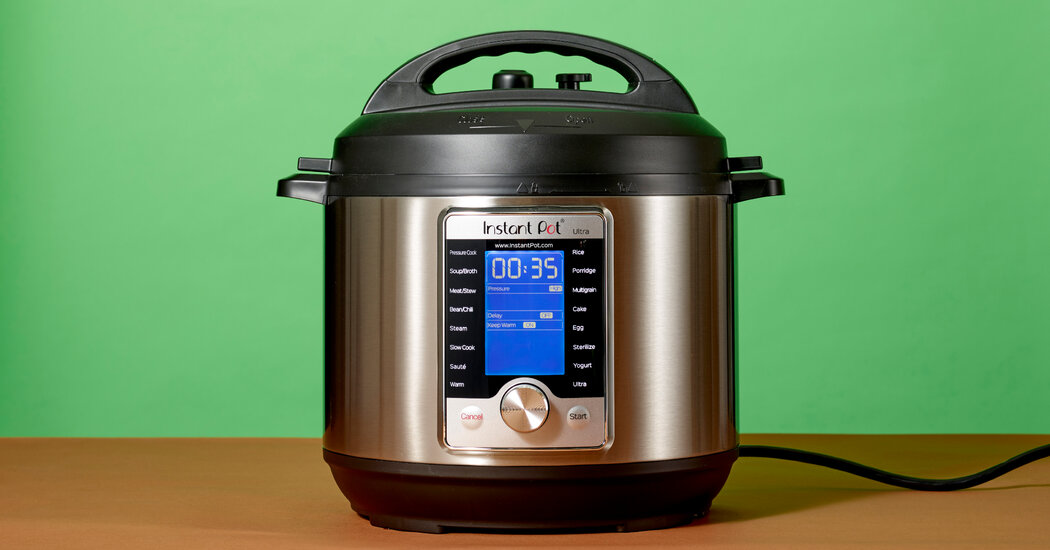Like most appliances, the Instant Pot used to keep quiet about its politics.
But recently, it went all-in for President Trump.
In June, a lobbyist for the countertop cooker announced a new line of devices emblazoned with Mr. Trump’s slogan “Make America Great Again.” The lobbyist said other manufacturers owned by the same private-equity firm would also make Trump-themed products: snow globes, dinner plates, flatware, bedsheets. The companies would donate all proceeds to the fund to build Mr. Trump’s presidential library.
It looked like a page out of a new political playbook.
The New York-based private equity firm, Centre Lane Partners, wanted the Trump administration’s help with tariffs and a looming antitrust inquiry, according to lobbying filings and interviews with people on Capitol Hill. To get it, the firm’s lobbyist augmented the usual backroom meetings with newly popular tactics in Mr. Trump’s second term: over-the-top public flattery of the president and gifts to his cause.
In this case, it backfired.
The lobbyist announced the merchandise — complete with mock-ups of a wee Mr. Trump inside a snow globe — without seeking the Trump Organization’s permission to use its trademarks or offering to give the president’s company a cut.
After The New York Times asked the Trump Organization about these plans, the company’s lawyers moved quickly to stop them.
Publicly announcing plans to infringe on the Trump Organization’s intellectual property rights was “concerning to say the least,” the company’s general counsel, Alan Garten, wrote in an email to the lobbying firm, a copy of which was reviewed by The Times.
Mr. Garten warned the firm that if any of its clients used the Trump name and trademarks without permission, “we would have no choice but to take appropriate legal action.”
The lobbying firm, the Texas-based Nestpoint Associates, apologized, another email showed. The MAGA Instant Pot was shelved before a single one was made. And it became a cautionary tale about how not to exploit Washington’s new rules.
Centre Lane and Nestpoint declined to answer specific questions about who proposed the MAGA Instant Pot and the other Trump-themed merchandise, what they were meant to accomplish or whether the plan was definitively dead.
“It is our practice not to comment on the specific plans of investee companies,” Quinn Morgan, Centre Lane’s co-founder and managing director, said in a statement.
A Sudden Push
Before this year, Centre Lane Partners had little history of lobbying or political activism. Federal campaign-finance records show only $70 in recent political donations from its executives: a pair of small gifts to the Republican fund-raising platform WinRed in 2020.
This spring, however, Centre Lane made a sudden push for influence in Washington.
Several of its companies hired Nestpoint to lobby the White House about tariffs, trade and “federal regulation and oversight.”
On Capitol Hill, the companies’ lobbyists mentioned one specific concern: a potential antitrust suit from the Federal Trade Commission, focused on a glassmaking plant owned by Corelle Brands that Centre Lane had purchased and shut down in Charleroi, Pa., according to two people familiar with those discussions. The people spoke on the condition of anonymity to describe private lobbying conversations.
The prospect of action by the Federal Trade Commission was also raised by Representative Guy Reschenthaler, Republican of Pennsylvania, who wrote a letter to the agency asking it to consider whether the company could find another buyer for the Charleroi plant before the agency took any action. A copy of the letter was obtained by The Times. Mr. Reschenthaler did not respond to requests for comment.
For many years, the plant’s workers had transformed molten glass into Pyrex-branded measuring cups and baking dishes, staples of kitchens across America. Centre Lane bought the plant last year, then closed it and shifted the Pyrex brand and some of the equipment to another glass company it owned: Anchor Hocking, based in Lancaster, Ohio.
“They shut the presses down, blew the steam lunch whistle for 132 seconds, to represent one second for every year of operation, and then the plant went silent,” said Jim Watt, a union representative at the Pennsylvania plant. “Then people walked out of the day shift, never to return.”
In response, Attorney General Michelle A. Henry of Pennsylvania — a Democratic appointee — sued last year to keep the plant open, saying that the closure reduced consumers’ choices by eliminating a major manufacturer of glassware from the market. Her Republican successor, David W. Sunday, has continued the lawsuit this year.
In legal filings, Centre Lane has argued that the Pennsylvania plant was less efficient than the one in Ohio, and that customers still had plenty of other choices, including imported glassware.
Experts on antitrust law said the case might be a revealing test for the Federal Trade Commission, since it seems to put two of Mr. Trump’s priorities in conflict: freeing U.S. businesses from interference from Washington and protecting American manufacturing jobs. The county that includes the Pyrex plant voted for Mr. Trump three times by wide margins.
The Federal Trade Commission, now led by Chairman Andrew N. Ferguson, a Trump appointee, declined to comment.
So far, Centre Lane was deploying the old Washington playbook: lawyers, lobbying, letters.
Enter the MAGA Instant Pot.
The appliance was announced by Alex Olson, a Nestpoint lobbyist, in the online media outlet Semafor on June 16.
Instant Pot — which Centre Lane had purchased after a bankruptcy last year — would not just add “Make America Great Again” to some devices, the Semafor article said. Others would carry the numbers 45 and 47, a reference to Mr. Trump, the 45th and 47th president.
In addition, Centre Lane’s collectibles company Lenox Corporation would make snow globes with Mr. Trump standing beside a tiny White House and plates with his face, according to Semafor. The firm’s linens company Live Comfortably would make bedsheets with the presidential seal and others named “Mar-a-Lago” after the president club in Florida. Mr. Olson said the company would also supply those sheets for free to the White House, Trump Hotels and Mar-a-Lago itself, if they wanted them.
A month later, in mid-July, Mr. Olson told The Times that plans for the Trump products were still on. “While the merchandise hasn’t officially launched yet, multiple lines are in development and expected to go live soon,” he wrote in an email.
In the past, this would have been an unusual arrangement: businesses rolling out product lines that flattered a president and funded his library, announced by a lobbyist they had hired to influence that president.
But in Mr. Trump’s second term, they echoed tactics that many people believed to have worked.
Several companies and prominent people have won legal reprieves after publicly flattering the president or giving to his causes. And Mr. Trump’s library foundation has served as a kind of collection box for companies trying to get on his good side.
Most recently, Paramount, the media company that owns CBS, pledged $16 million, after Mr. Trump’s legal fees, to the library to settle a lawsuit brought by Mr. Trump. Filed just before the election in November, the complaint said CBS’s “60 Minutes” had misleadingly edited an interview with Kamala Harris, the Democratic presidential nominee, giving her party an unfair advantage. A few weeks after the CBS settlement, the Federal Communications Commission — led by a Trump appointee — gave its approval to Paramount’s long-sought merger with the Hollywood studio Skydance.
Donations such as these might not go to Mr. Trump directly, but he could avoid some of the arduous fund-raising most presidents face after leaving office to build a monument to their legacies.
A Missed Step
Mr. Olson declined to say why all these products were being launched at this moment. Was it coincidental to the firm’s regulatory troubles? Or were the products meant to be a type of lobbying, a show of support for Mr. Trump at a time when Centre Lane wanted his administration’s help?
If the latter was their plan, they missed a crucial step.
The president’s company has business partners all over the world, who have placed his name on everything from cryptocurrency to hotels to golf courses to cell phones. Those deals have entangled his business with countries, companies and industries that want something from his administration, creating wide-ranging conflicts of interest.
But those partners got Mr. Trump’s permission first. (Many small-time operators use his name without permission, like those selling hats and T-shirts on card tables outside his rallies. But those people do not generally announce their plans to news outlets.)
When the Trump Organization threatened legal action last week, Nestpoint backed off, saying that none of the Trump merchandise had been produced or sold, according to an email reviewed by The Times. The lobbying firm also promised that its clients would seek approval before using the Trump brand from now on, addressing the Trump Organization’s concern that its intellectual property might be stolen.
“We are of course relieved to hear that this is not the case,” Mr. Garten, the general counsel, wrote to the lobbying firm, according to an email reviewed by The Times.
Does that mean the MAGA Instant Pot is done for good, or just done for now? Emails reviewed by The Times showed that the lobbyists seemed to keep open the possibility that they would return to their plans for Trump merchandise, but next time they would ask permission.
Neither the lobbying firm nor Centre Lane gave a direct answer when The Times asked if the plans for Trump merchandise had been canceled.
“There are many thoughts on strategies,” said Stuart Jolly, an official in Mr. Trump’s 2016 campaign who is the lobbying firm’s director of government affairs and global strategies. “And we’re working diligently to help create — and keep — more jobs for our clients through our efforts.”
David A. Fahrenthold is a Times investigative reporter writing about nonprofit organizations. He has been a reporter for two decades.
Ben Protess is an investigative reporter at The Times, covering President Trump.
The post The Short-Lived Plan to Produce a Trump-Themed Instant Pot appeared first on New York Times.




